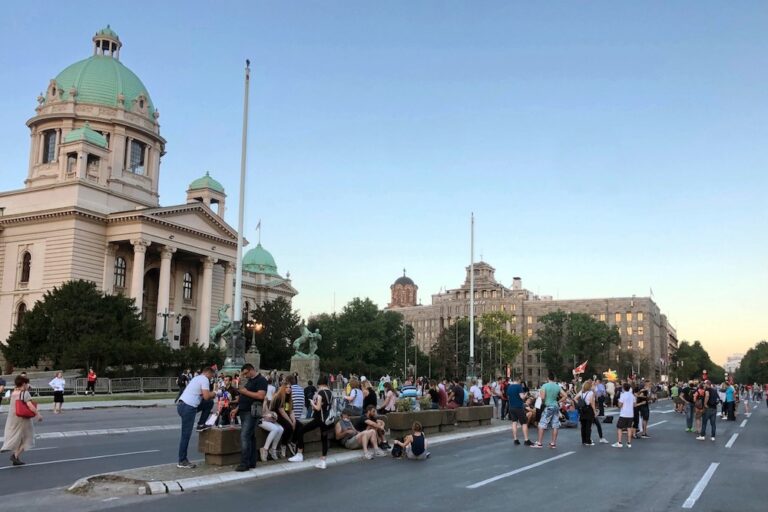(CPJ/IFEX) – The following is a CPJ letter to Minister of Information Goran Matic: **Updates IFEX alerts on the Curuvija case of 19 April, 13 April, 12 April, 15 March, 12 March, 10 March, 9 March and 8 March 1999; for additional information see IFEX alerts of 28 October, 27 October, 20 October, 18 October, […]
(CPJ/IFEX) – The following is a CPJ letter to Minister of Information Goran
Matic:
**Updates IFEX alerts on the Curuvija case of 19 April, 13 April, 12 April,
15 March, 12 March, 10 March, 9 March and 8 March 1999; for additional
information see IFEX alerts of 28 October, 27 October, 20 October, 18
October, 4 October, 30 September and 23 September 1999 and others**
Goran Matic
Minister of Information
Federal Republic of Yugoslavia
Belgrade, Yugoslavia
VIA FACSIMILE
November 8, 1999
I am writing once again to express CPJ’s ongoing concern about the
deterioration of press freedom conditions in Serbia, and about the continued
harassment and prosecution of journalists there.
I last wrote on September 30, to remind you of the commitment you made
during our September 20 meeting in Belgrade to investigate a number of press
freedom abuses. In your October 6 response, you objected to statements I
made to the Serbian press regarding the April 23 bombing of Radio and
Television Serbia (RTS). As you well know, the concerns I raised about RTS
officials not taking sufficient action to safeguard the security of their
employees prior to the NATO attack have been voiced repeatedly in the local
press, and by the families of the victims.
Meanwhile, CPJ is distressed that no progress has been made in the
investigation into the April 11 murder of editor and publisher Slavko
Curuvija, notwithstanding your personal commitment to me. In an October 12
press conference, Serbian Information Minister Aleksandar Vucic stated that
there was no new evidence in the investigation. He then added that
journalists were “misusing the case to present it as an attack on freedom of
the media.”
Let me remind you that it was the series of repressive measures taken
against Curuvija just prior to his murder that have led many, including CPJ,
to ask that the investigation examine the possibility of official
involvement in the crime. Curuvija, the owner of the newspaper Dnevni
Telegraf and the magazine Evropljanin, was ambushed and shot by two men as
he and his wife were returning to their home in downtown Belgrade after an
evening stroll. In the months prior to his murder, he faced systematic
government harassment. On March 8, judge Krsto Bobot sentenced Curuvija to
five months in jail for “spreading false information,” a violation of
Serbia’s restrictive information law. The charges resulted from an article
he published linking the killing of a Belgrade doctor to Serbian Deputy
Prime Minister Milovan Bojic. Curuvija refused to pay the fine, and was
appealing the sentence at the time of his death. Finally, just days before
his murder, state television broadcast accusations against Curuvija alleging
that he supported NATO’s attack on Yugoslavia
During our meeting in September, you also promised to look into the criminal
prosecution of journalist Zoja Jovanov, a former financial editor with
Dnevni Telegraf. Jovanov faces criminal charges over an article about the
possible devaluation of the dinar that she published in September 1998. (The
dinar was in fact devalued six weeks after the article appeared.) If
convicted for “distributing false information,” Jovanov could go to prison
for five years. Her trial is scheduled to begin in late November.
CPJ is concerned that Jovanov faces any sort of prosecution on this
ridiculous charge. We are also troubled that Krsto Bobot, the same judge who
sentenced the late Slavko Curuvija, will preside over her trial, despite a
motion from her attorney that a new judge be appointed.
While these current cases remain unresolved, new attacks against journalists
continue to occur. As CPJ noted in its October 1 letter to you, over nine
journalists were attacked by police forces during two days of
anti-government protests in Belgrade on September 29 and 30.
It is equally dismaying that, despite your promises to review cases
involving alleged violations of Yugoslavia’s draconian Serbian Information
Law, fines continue to be levied against the press. In the year since that
law was passed, over 30 separate charges against various media have resulted
in fines totaling over 19.6 million dinars (US$1.6 million).
In the months since our meeting, at least three separate media outlets have
been fined for not registering with the “proper authorities” and for
subsequently violating the law by continuing to publish. As of October 29,
ABC Grafika, the main publisher of independent newspapers in your country,
and its editor Slavoljub Karacevic, were fined over 1 million dinars
(US$84,745) on 21 separate violations for printing issues of the opposition
news bulletin Promene.
In a separate case, Promene itself was fined 320,000 dinars (US$27,119) for
violation of the information law and is being sued for defamation by the
Deputy Serbian Information Minister, Radmila Visic. A group of concerned
citizens calling itself Team 29 reportedly paid the fine.
Also, on October 22, Belgrade’s Municipal Court fined the Dan Graf Company,
which publishes the independent Belgrade daily Danas, 280,000 dinars
(US$23,729) for “taking advantage of press freedom.” The complaint was
brought by Vojislav Seselj, vice-president of the Serbian government and
leader of the ultra-nationalist Serbian Radical Party. The complaint was
based on an October 19 interview with Novak Kilibarda, Vice-Prime Minister
of Montenegro. In the interview, Killibarda stated that he overheard Seselj
threaten to expel Montenegrins from Serbia or force them to wear identity
bands. Journalists cannot work in an environment in which they know they can
be fined for reporting the comments of a public official.
Finally, CPJ is distressed by the recent ban that your government placed on
Reporter, a popular Bosnia-based weekly. On September 21, the Yugoslav
Ministry of Information was reported to have officially “declined approval
for importing” the magazine. On the same day Serbian border guards
confiscated 8,000 copies of Reporter. The publication’s editor, Perica
Vucinic, says he believes the ban is related to an article which implicated
many of Serbia’s wealthier families in a series of embezzlement and
corruption scandals.
As Minister of Information, it is your obligation to ensure that journalists
in Yugoslavia are free to practice their profession, as guaranteed under
your country’s constitution and in international law. We are urging you once
again to meet this important responsibility.
Sincerely,
Joel Simon
Deputy Director
CC
Ivan Markovic, Federal Telecommunications Minister
Aleksandar Vucic, Serbian Information Minister
Rade Drobac, Public Relations Department, Federal Ministry of Foreign
Affairs
Recommended Action
Similar appeals can be sent to:
Appeals To
Goran Matic
Minister of Information
Palace of Federation, 2 Lenin Boulevard
Belgrade, Federal Republic of Yugoslavia
Fax: +38 311 600 446
Please copy appeals to the source if possible.


